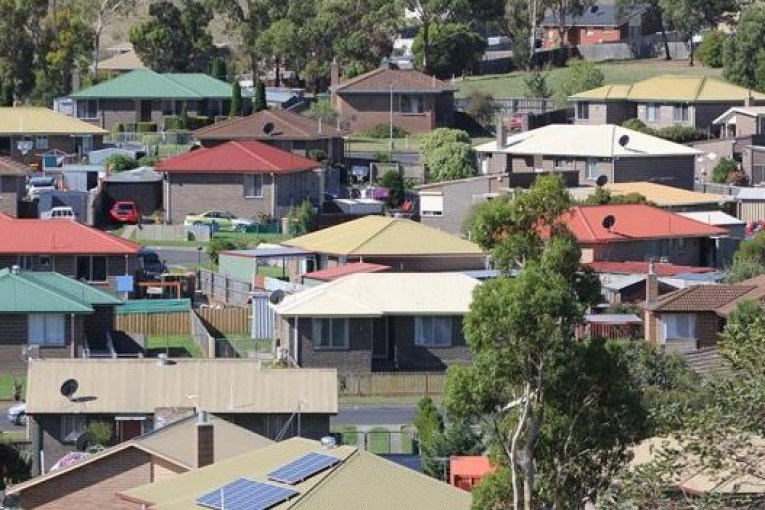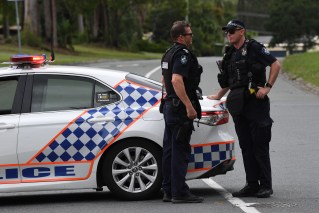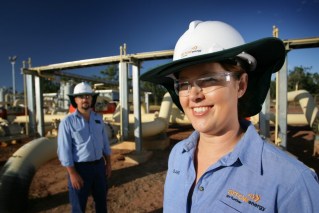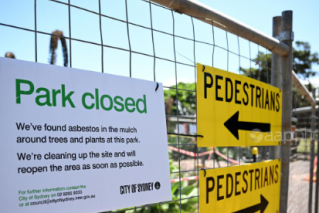How mining companies are planning a $1 billion ‘gift’ to our farmers
Queensland farm groups and a key lobbyist of Australia’s gas industry are applying pressure to have redundant mining assets worth more than $1 billion transferred for agricultural use.

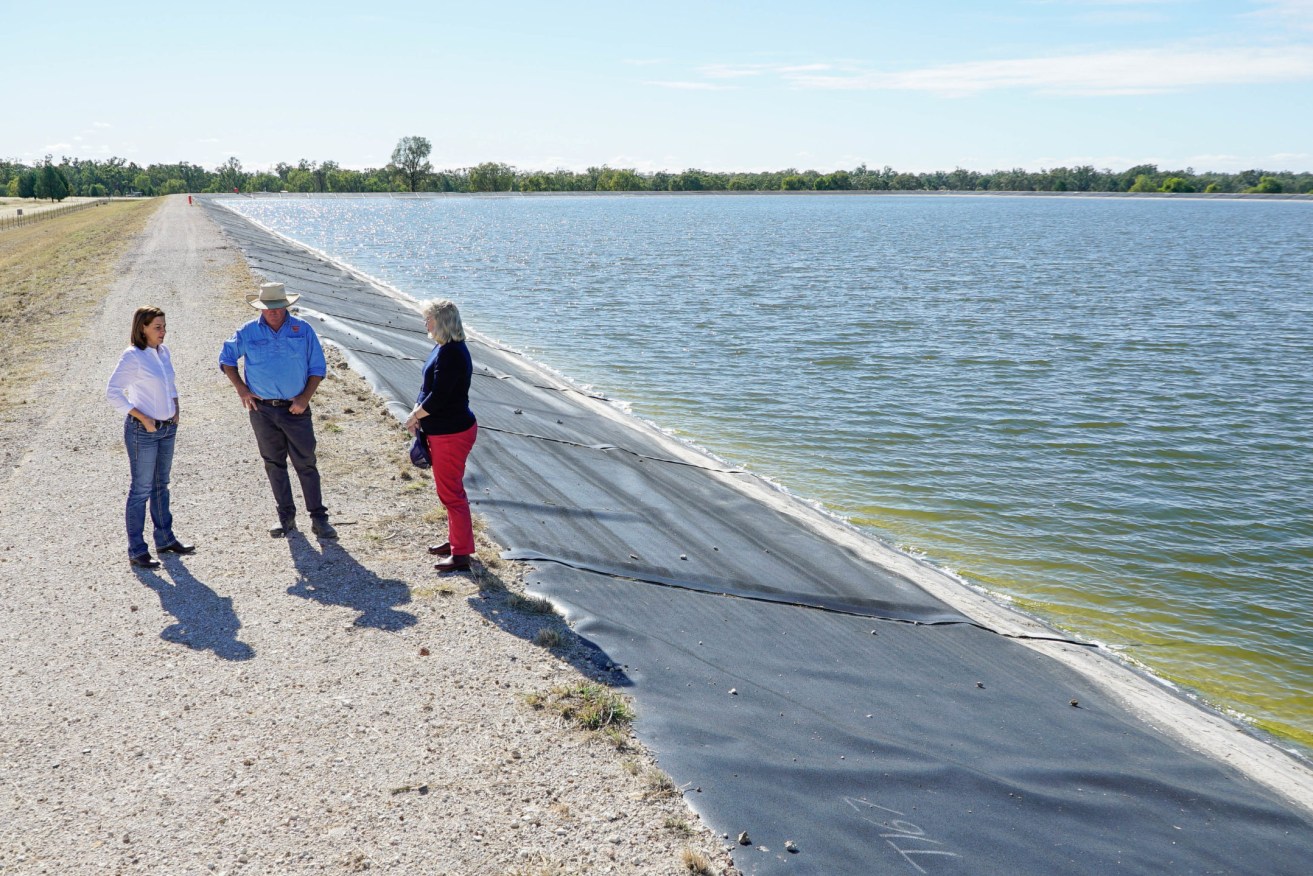
Opposition Leader Deb Frecklington and Member for Warrego Ann Leahy inspect a dam built for gas extraction on the property of farmer Simon Drury, near Miles.
The plan would see high-quality infrastructure such as dams, roads, pipelines and fences – purpose-built for the extraction of coal seam gas (CSG) – turned over for landholders to use once the mining project comes to an end.
Peak gas body, the Australian Petroleum Production and Exploration Association (APPEA), has described the plan as a “win-win” that saves mining companies the cost of dismantling the infrastructure, while offering farmers first-class assets to enhance their farming operations.
APPEA says gas extraction companies have signed more than 4500 agreements with landowners since development began, paying more than $500 million to farmers and landowners for access to their land.
Now the gas industry wants to offer more, with the proposal to return equipment from those projects back to farmers, a gesture that the Opposition sees as a vote-winner while winning praise from the Queensland Farmers’ Federation (QFF) and AgForce.
Opposition Leader Deb Frecklington has vowed to take the proposal as LNP policy into the October State election, promising to revise current Department of Environment and Science (DES) regulation that prohibits asset ownership transfer without the surrender or partial surrender of the overlying tenure and environmental authority.
“Forcing natural gas companies to rip up perfectly good water, road and fence infrastructure that could boost agricultural productivity is just plain dumb,” Frecklington said.
“If farmers want the dam, the irrigation system, the gate or the grid it shouldn’t be ripped up, it should be repurposed.
“This is common-sense policy that will make our natural gas industry more cost competitive and our farmers more productive.
“There is almost a billion dollars worth of infrastructure that could be repurposed giving our agricultural sector a massive boost, particularly when two-thirds of our state is in drought.”
Environment Minister Leeanne Enoch said Frecklington’s position was off the pace and that talks this week had started to consider the proposal’s merits.
“The transfer of infrastructure to landholders can already happen at the surrender of a resource lease,” Enoch said.
“The Department of Environment and Science had a productive meeting with QFF and AgForce this week to discuss how to further refine the framework.”
‘Positive, long-term legacy’
APPEA Queensland director Georgy Mayo, AgForce CEO Mike Guerin and QFF CEO Georgina Davis confirmed their organisations sent a joint submission to the State Government outlining the proposal.
They have praised the LNP for endorsing their plan, while encouraging Enoch’s department to commit to the program.
In a joint statement they said:
“Well-maintained CSG infrastructure could offer landholders who host mining operations a positive, long-term legacy.
“Given the construction quality of many of these assets which are built to commercial resources standards, they are potentially very useful and valuable to landholders.
“Of course, the transfer of these assets must be transparent and ensure that farmers are aware of any associated obligations as well as any residual risk that the environmental regulator may impose.
“That said, there are great opportunities for all parties and now is the time for some common sense on a win-win opportunity.”
Turbulent history
CSG extraction has occurred in Queensland since the mid-1990s, predominantly across the Darling Downs and parts of central Queensland, involving the controversial practice of hydraulic fracturing, or fracking, which releases gas trapped in underground coal seams by injecting high-pressure water through rock.
More than a 1000 CSG wells continue to dot the rural landscape, which some farmers, scientists and green groups say have drained water tables, poisoned waterways, created air pollution and degraded land quality.
Despite fracking being banned in several overseas countries, gas proponents maintain the practice is safe, and has brought economic activity to rural communities, while generating mining royalties for the Queensland Government for more than two decades.
Mayo said a report late last year by Lawrence Consulting underlined the importance of the sector for jobs and economic wealth creation for the state, particularly in regional areas such as Gladstone, Toowoomba, Roma, Chinchilla and Dalby.

APPEA Queensland director Georgy Mayo.
She said the report tallied almost $5 billion spent on wages state-wide during the period with the industry employing more than 4600 people on a full-time basis.
“These are world-class jobs, in a world-class industry, right here in our back yard,” she said.
“The industry outlaid around $50 billion on purchasing goods and services from local businesses, making contributions to the communities in which they live and work, and payments to local government as well as royalties, stamp duty and tax.”
APPEA also claims its mining activity has long-term environmental benefits, with almost all of the 66,000 megalitres of groundwater produced by the industry treated and reused, offering a lifeline to farmers and communities that have been suffering through a crippling drought.
“The increased use of natural gas in power generation, and its support for the integration of renewable sources into our energy mix, is helping reduce Queensland’s dependence on coal-fired electricity, which has fallen from over 90 per cent in 2005 to around 75 per cent today – in turn contributing to a reduction in emissions by 14 per cent in the same period,” Mayo said.
Currently there is an obligation on mining companies to rehabilitate land and in some cases remove infrastructure on farms once their extraction projects come to an end.
Enoch said the Palaszczuk Government had implemented strong mine rehabilitation laws in Queensland and had introduced new legislation to create a Rehabilitation Commissioner, a first for Queensland.
